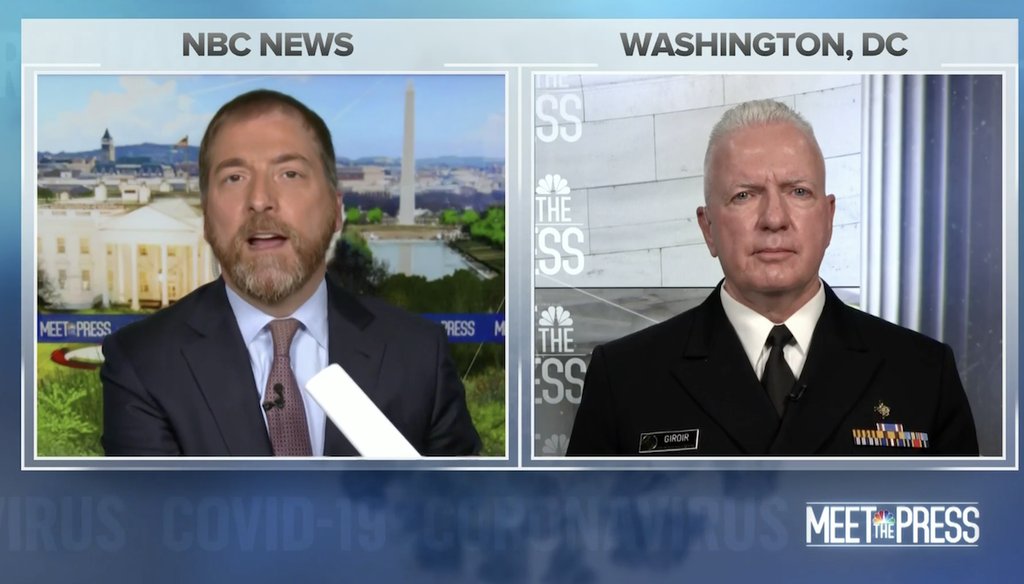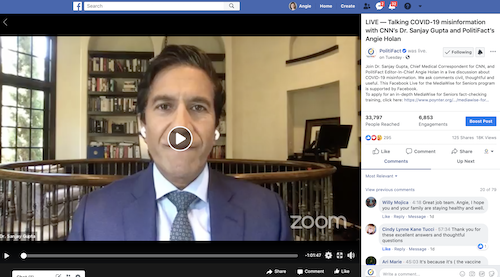Stand up for the facts!
Our only agenda is to publish the truth so you can be an informed participant in democracy.
We need your help.
I would like to contribute

"The Week in Fact-checking" compiles short summaries of our best work; the links will take you to our full reports. Want this report early and via email? Sign up here.
This week: What hydroxychloroquine studies found … Schumer misleads on GOP bill … Trump’s Axios interview, fact-checked … Were there kidnappings in Portland? … Trump wrong on absentee balloting … Obama says it’s time for the filibuster to go … The strange persistence of "drunk Pelosi" memes … PolitiFact talks to Sanjay Gupta for Mediawise for Seniors
President Donald Trump likes hydroxychloroquine as a remedy for COVID-19, but some of his top health officials are gently reminding people of the science.
On NBC’s Meet the Press, Adm. Brett Giroir, the assistant secretary of health and overseer of the virus testing effort, said it is time to "move on."
"There have been five randomized controlled, placebo controlled trials that do not show any benefit to Hydroxychloroquine," Giroir said Aug. 2. "So, at this point in time, we don't recommend that as a treatment." Is that true?
Sign up for PolitiFact texts
We asked Giroir’s office to name the five studies he referenced in that interview. Not all of them used placebos, but they all randomly assigned patients to hydroxychloroquine treatment and conventional treatment groups. The drug proved itself in none of them. We rated Giroir’s statement Mostly True.
Before we list the studies, a brief word about why randomized studies matter: People aren’t identical. You can weigh them, look at their medical histories, and more, and yet, you still might miss something. That’s where randomly assigning patients to treatment and non-treatment groups comes in. Researchers say it’s the best way to be sure that the only effect on the patient is the effect of the drug.
Giroir’s office sent us a list of the studies he had in mind. All of them used the randomized control approach. They all found the drug ineffective. Here’s the list, which we independently confirmed:
-
A Cluster-Randomized Trial of Hydroxychloroquine as Prevention of Covid-19 Transmission and Disease, MedRxIV, July 26, 2020. This study out of Spain aimed to see if the drug prevented the disease. It involved about 2,300 people who had been exposed. After random assignment, one group got hydroxychloroquine for a week, and the other didn’t. "Post-exposure therapy with hydroxychloroquine did not prevent SARS-CoV-2 disease and infection," the authors wrote.
-
Hydroxychloroquine with or without Azithromycin in Mild-to-Moderate Covid-19, New England Journal of Medicine, July 23, 2020. This study from Brazil assigned 665 patients to three groups: standard care, hydroxychloroquine plus azithromycin and hydroxychloroquine alone. "Among patients hospitalized with mild-to-moderate COVID-19, the use of hydroxychloroquine, alone or with azithromycin, did not improve clinical status at 15 days as compared with standard care," the authors wrote.
-
Hydroxychloroquine in Nonhospitalized Adults With Early COVID-19, Annals of Internal Medicine, July 16, 2020. This study of 491 patients in the U.S. and Canada used two groups: one receiving hydroxychloroquine and the other a placebo. The researchers hypothesized that starting hydroxychloroquine therapy within the first few days of symptoms could alter the course of COVID-19. But they found no difference in the severity of symptoms after 14 days.
-
No clinical benefit from use of hydroxychloroquine in hospitalised patients with COVID-19, Recovery Trial - University of Oxford, June 5, 2020. This United Kingdom study randomly assigned over 4,600 patients with COVID-19 to a hydroxychloroquine treatment group and a standard care group. Among the treatment group, 25.7% died, compared with 23.5% for the standard care group. That was not statistically different.
-
A Randomized Trial of Hydroxychloroquine as Postexposure Prophylaxis for Covid-19, New England Journal of Medicine, June 3, 2020. This study of 821 people focused on hydroxychloroquine as a way to avoid getting the disease. The hydroxychloroquine group was slightly less likely to test positive after two weeks, 11.8% compared to 14.3% in the placebo group, but the numbers were too small to pass statistical muster.
For more details on the studies, as well as a discussion of the placebo effect, read our complete fact-check.
— Jon Greenberg
-
Charles Schumer exaggerates medical liability provisions of Republican bill. Congress is negotiating more COVID-19 relief and arguing about what should be in the bill. Schumer, the Democratic Senate minority leader, said, "You know what's in this bill? No medical malpractice suits until 2024, even if they're not COVID-related." That rates Mostly False. The bill does not prohibit the filing of medical malpractice lawsuits. It sets immunity standards related only to COVID-19. Some experts say the language is broad enough to have a chilling effect on other types of medical malpractice lawsuits, but the bill does not include a ban on all suits.
-
Trump wrong that there’s a difference between absentee voting and voting by mail. At a briefing, Trump repeated his objections to voting by mail, saying it was fundamentally different than vote by mail. We rated this False. There is no objective difference between absentee voting and voting by mail. All mail ballots, regardless of how they are requested, are treated the same once they’re cast. They all require verification before being counted.
-
Did federal agents hold citizens without charges? Yes. When Trump threatened to send federal agents to Philadelphia, U.S. Sen. Bob Casey, D-Pa., accused the officers in Portland of "kidnapping and holding citizens without charges." We rated this Mostly True. A federal judge noted that one protester’s arrest appeared unconstitutional, and a Trump administration official said federal agents lacked probable cause for another arrest. Legal experts say those seizures meet the common language definition of kidnapping, even as they stressed that the officers involved would never be formally charged.
Knowing the facts has never been more important. Please consider donating to PolitiFact today.
In a rare sit-down interview at the White House, President Donald Trump repeated a slew of misleading claims about the U.S. coronavirus response while Axios reporter Jonathan Swan reacted with skepticism and disbelief.
"Right now, I think it’s under control," Trump said, referring to the pandemic.
"How? 1,000 Americans are dying a day," Swan asked.
"They are dying — that’s true. And it is what it is," Trump responded. "But that doesn’t mean we aren’t doing everything we can. It’s under control as much as you can control it."
The nearly 40-minute one-on-one interview was filmed on July 28 and aired on HBO on Aug. 3. Other topics included political protests, foreign policy and the upcoming election.
Here are three of our fact-checks from the interview; read our complete story for the other 19.
"You can test too much, read the manuals… read the books."
We found no evidence for this. It isn’t clear what "manuals" and "books" the president is referring to.
"We have a much bigger epidemic, so you have to test more proportionately," said Jennifer Kates, a senior vice president at the Kaiser Family Foundation.
Scientists and both political parties agreed early in the pandemic that testing must be expanded to track how the virus spreads and to make sure sick people without symptoms quarantine. Currently, increased testing is recommended by the CDC to help people safely return to work and schools.
— Emily Venezky
"Because we do more tests, we have more cases."
This is incorrect. The clearest view of how the coronavirus is spreading is through the lens of the percentage of coronavirus tests that come back positive. If more tests are being conducted and more of them are coming back positive, that means that the virus is spreading beyond just the increase in testing. And of course, cases occur whether or not someone tests for the virus.
Between April and June, testing went up significantly and the share of positive results went down. But in June, the share of positive tests climbed. While it has leveled off and eased a bit, it is still more than three percentage points higher than in the spring.
— Jon Greenberg and Louis Jacobson
"We’re largely out of Afghanistan."
As Swan pointed out in the interview, that’s not right. There’s almost the same number of U.S. troops in Afghanistan now as there were when Trump took office.
At the time of Trump’s inauguration, there were roughly 8,400 U.S. troops in Afghanistan.
Currently, about 8,600 troops remain in the country.
The number ballooned to around 14,000 at one point in Trump’s term, but has declined over the last several months.
— Samantha Putterman
This week, PolitiFact got to have a live conversation with Dr. Sanjay Gupta, Chief Medical Correspondent for CNN. Our topic was how people can keep themselves safe from both COVID-19 and misinformation about COVID-19.
We recorded the conversation via Facebook, and it was hosted by Alex Mahadevan of Mediawise, the Poynter Institute’s media literacy program. It was all part of the MediaWise for Seniors program, which is supported by Facebook.
We got to ask Sanjay questions like: What do you do to keep safe from COVID-19? What are the red flags for hoaxes? What lessons have you learned from past pandemics that we can apply now?
Watch a recording of our conversation, and if you’re interested in how to stop the spread of misinformation, apply for an in-depth MediaWise for Seniors fact-checking training via Poynter.
It’s a busy time in U.S. politics, and that means it’s a busy time for PolitiFact. Here are three more stories we published this week that will give you more depth and insight into the issues of the day.
Barack Obama calls the filibuster ‘a Jim Crow relic.’ Former President Barack Obama made some news when he delivered a eulogy for U.S. Rep. John Lewis, the civil rights activist and Democratic congressman from Georgia. Obama said he was open to ending the filibuster, the longstanding rule in the U.S. Senate that allows a minority of 41 senators to block action on a bill. Obama called it "a Jim Crow relic." We wanted to know more about the history of the filibuster and its role in the Jim Crow era. Historians told PolitiFact that the filibuster did not emerge from debates over slavery or segregation. But the parliamentary tactic has been closely affiliated with opposition to civil rights for more than a century. Our report reviews that history.
False claims about Nancy Pelosi being drunk keep going viral even though she doesn’t drink. As a partisan fight over the White House coronavirus task force continues to play out in Washington, an altered video that makes it look like House Speaker Nancy Pelosi is drunk has gone viral on Facebook. The video is doctored — Pelosi’s speech was slowed down to make it look like she was drunk. Her office and family have noted that Pelosi doesn’t drink alcohol. So why the persistence of the claim on social media? Experts said portraying Pelosi as a drunk is a simple way to attack her credibility and spread misinformation. Read more about what they had to say. You can also watch our Truth-O-Meter Minute that shows how the video was doctored. And don’t believe the next "drunk Pelosi" meme that comes across your feed.
Veep contender Karen Bass’ history on Cuba. U.S. Rep. Karen Bass, D-Calif., has had a lower profile than other Democrats, but now is a contender to be Joe Biden’s vice presidential running mate. That higher profile is coming with more scrutiny of her past positions, including her positions on Cuba. As a congresswoman, Bass traveled to Cuba with the Obama administration in support of its policies. But Bass took her first trip to Cuba at 10 to help build homes. She returned to Cuba several times in the 1970s. Bass called Fidel Castro "Comandante en Jefe" when he died. The phrase was used by Castro and seen as praise for him. Bass said recently she "wouldn’t do that again." Read more about Bass and Cuba.
Do you smell smoke?
Here's your Pants on Fire fact-check of the week:
No, Donald Trump was NOT caught on a hot mic insulting his supporters.
See what else we've rated Pants on Fire this week.
Our Sources
See linked fact-checks for sources.






















































